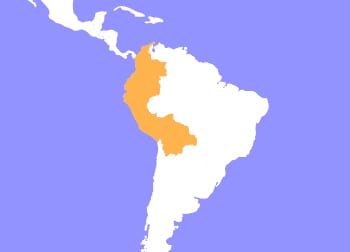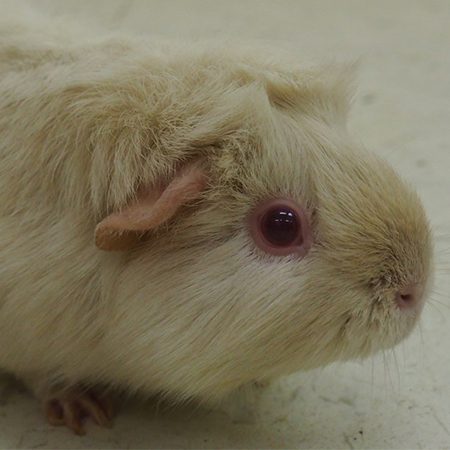Guinea Pig
Cavia porcellus
The guinea pig is also known as the domestic guinea pig, a species of rodent belonging to the family Caviidae and the genus Cavia. Despite the name, guinea pigs are not native to Guinea, nor are they biologically related to pigs. They originated in the Andes of South America, studies suggest they are domesticated descendants of a closely related species of cavy such as Cavia tschudii, therefore they do not exist naturally in the wild.
In western society, domesticated guinea pigs have gained widespread popularity as a household pet. This is largely in part due to their docile nature, friendly responsiveness, and relative ease of care. There have been organizations developed, that are devoted to the competitive breeding of guinea pigs. There are many specialized breeds with varying coat colors, textures, and lengths. They have also been bred to not have any fur at all, this breed is called a skinny pig, or hairless guinea pig.
The average weight of an adult guinea pig is between 1 to 3 lbs, measuring between 8 - 10 in. Pet breeds live an average of 4 - 5 years, with the longest living guinea pig on record living 14 years. Guinea pigs are extremely smart, especially when it comes to problem solving for food, they can remember complex paths for months. Guinea pigs will sometimes participate in social grooming, they do also regularly self groom.

Guinea Pigs originated in the Andean region of South America. Ranging across, Columbia, Ecuador, Peru and Bolivia.
HABITAT -Domesticated guinea pigs live in home environments with humans; originally coming from Andean region of South America.
DIET -Mainly consisting of grass and hay, dry food pellets, fresh fruits and vegetables.
FUN FACT -A guinea pig is born with teeth that constantly grow throughout their life.
SOCIAL BEHAVIOR -They live together harmoniously, and participate in social grooming with other guinea pigs.
ACTIVITY -They are crepuscular, tending to be most active at dawn and dusk.
PREDATORS -Predators include cats, coyotes, wolves, snakes, owls, and humans.
SIZE -Typically between 1 to 3 lbs, measuring between 8 - 10 in.
RELATIVES -Belonging to the Cavia family, they are related to other rodents like the Patagonian Cavy.
CONSERVATION -Domesticated Guinea Pigs are considered Least Concern on the IUCN Red List.
Cub Creek Animal Care Information
Housing - Our Guinea Pigs live in specialized enclosures housed in the Small Animal Room. The enclosure provides plenty of space allowing for a variety of hide spaces to make them feel safe and room to explore. Their enclosure is bedded with shavings to make cleanup easy and they always have access to clean water.
Diet - We feed our Guinea Pigs a balanced diet of vegetables, dry food, and hay to ensure they get all the nutrition they need. We’ll cut up their fruit and vegetables (consisting of sweet potatoes, lettuce, etc.) and arrange them a veggie platter they love! They also enjoy special treats like dried fruits, and other green vegetables.
Enrichment - Our Guinea Pigs are very sociable animals, they enjoy playing with one another and interacting with campers. During the summertime, campers will make them special toys from cardboard and other materials.

